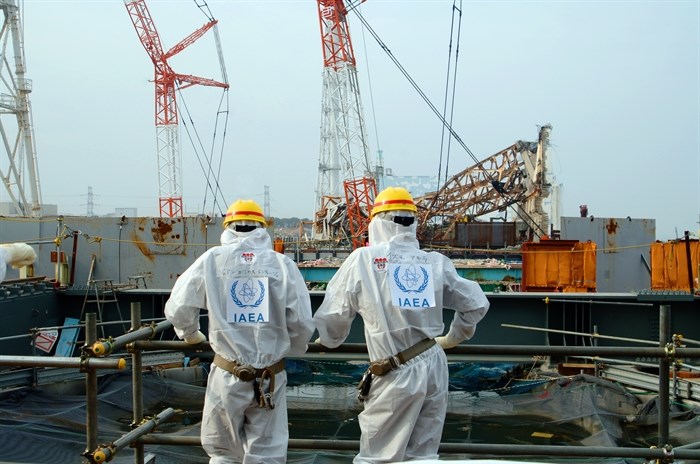
Experts examine recovery work at Fukushima Daiichi Nuclear Power Station.
Image Credit: SUBMITTED/Wikicommons
August 20, 2017 - 10:30 AM
A handful of Ontario university students are touring parts of Japan to better understand the devastating effects of the country's 2011 nuclear disaster and the problems that persist.
Five graduate students from McMaster University's radiation sciences program landed in Japan on Wednesday for a 10-day tour of the Fukushima region where they'll spend time in a restricted zone, stay with families devastated by the disaster and tour the wrecked Fukushima Daiichi power plant, the site of the nuclear meltdown.
They are part of the Fukushima Ambassador Program, which is funded by the Japanese government and the nuclear plant's operator, Tokyo Electric Power Co. The initiative is designed to teach students from around the world about the physical, economic and social consequences of the disaster.
On March 11, 2011, a massive offshore earthquake triggered a tsunami that eventually led to a catastrophic nuclear meltdown that spewed radiation into the environment. The disaster claimed more than 15,000 lives, the vast majority due to drowning from the tsunami.
The nuclear meltdown led to large-scale evacuations and more than 100,000 people remain without a permanent home.
For the budding Ontario scientists visiting the region, the trip is an opportunity to learn about life outside the laboratory.
"It's good to keep in mind that the decisions you make as a scientist can have incredible repercussions," McMaster student Monique Stuive, 24, said in an interview from Japan.
"It makes you realize the importance of doing a good job and seeing how it affects people, especially since a lot of us are thinking of doing a career in the nuclear industry."
There will be a market for the skills that Stuive and her colleagues are learning as nuclear reactors in Canada get refurbished and decommissioned, said Stuive's professor, Fiona McNeill, who runs the radiation sciences program at McMaster.
"We'll do research on effects of low doses from refurbishment and decommissioning reactors in Ontario," McNeill said. "It's important for workers or anyone living near the reactors, as well as the effects on plants and animals. For those reasons, Fukushima is really relevant to everything we do."
One hot topic in the radiation science community is analyzing the evacuations that took place in 2011, she said.
"It seems that some of the choices made actually did more harm then good," McNeill said.
"The decision was made to evacuate intensive care units around Fukushima and that was based on the current understanding of radiation protection, where you're preventing people from getting cancer 25 to 30 years from now. But it would appear that a number of people died after because of the stress of being moved out of elderly care homes and ICUs."
Of course, she admitted, it's easy to look back and question everything.
"But it's important to ask those questions and it's especially important for scientists of the future. I do want these students to actually think about these things and be aware about it and learn it."
The students are also learning about the safety of Fukushima today. While there are areas that still remain under an evacuation order because radiation levels remain too high, vast swaths of land are considered safe.
On Thursday, the students visited the Fukushima Agricultural Technology Centre to see how it monitors and tests food that goes out to market.
"They look at every single bag of rice," Stuive said.
The students also learned about a mushroom farmer who had to give up growing the fungi because they soak up more radioactive elements from the soil compared to other crops, Stuive said.
"The two things I'm most looking forward to is going to the nuclear power station itself and seeing how it looks, and talking to someone who worked there, and we get to stay with a local family for a certain amount of time," she said.
"They've lost family members and yet they're willing to take us in and welcome us, which speaks to the warmth of the people here."
News from © The Canadian Press, 2017